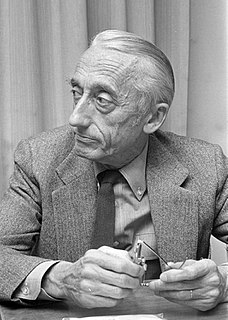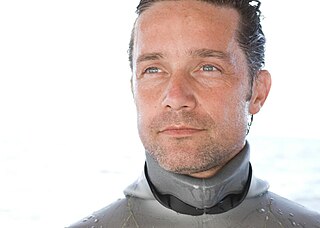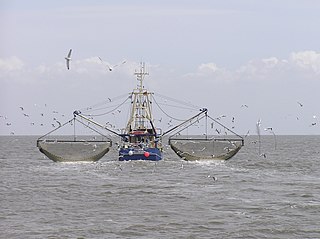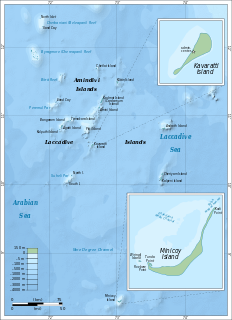Related Research Articles

Jacques-Yves Cousteau, was a French naval officer, explorer, conservationist, filmmaker, scientist, photographer, author and researcher who studied the sea and all forms of life in water. He co-developed the Aqua-Lung, pioneered marine conservation and was a member of the Académie Française.

Marine biology is the scientific study of the biology of marine life, organisms in the sea. Given that in biology many phyla, families and genera have some species that live in the sea and others that live on land, marine biology classifies species based on the environment rather than on taxonomy.

Corals are marine invertebrates within the class Anthozoa of the phylum Cnidaria. They typically form compact colonies of many identical individual polyps. Coral species include the important reef builders that inhabit tropical oceans and secrete calcium carbonate to form a hard skeleton.

The Aquarius Reef Base is an underwater habitat located 5.4 miles off Key Largo in the Florida Keys National Marine Sanctuary. It is deployed on the ocean floor 62 feet below the surface and next to a deep coral reef named Conch Reef.

Marine conservation, also known as ocean conservation, is the protection and preservation of ecosystems in oceans and seas through planned management in order to prevent the over-exploitation of these resources. Marine conservation is informed by the study of marine plants and animal resources and ecosystem functions and is driven by response to the manifested negative effects seen in the environment such as species loss, habitat degradation and changes in ecosystem functions and focuses on limiting human-caused damage to marine ecosystems, restoring damaged marine ecosystems, and preserving vulnerable species and ecosystems of the marine life. Marine conservation is a relatively new discipline which has developed as a response to biological issues such as extinction and marine habitats change.

Project AWARE is a registered nonprofit organization working with volunteer scuba divers. With offices in UK, US, and Australia, Project AWARE supports divers acting in their own communities to protect the ocean, with a focus on implementing lasting change in two core areas: shark conservation and marine litter.

Fabien Cousteau is an aquanaut, ocean conservationist, and documentary filmmaker. As the first grandson of Jacques Cousteau, Fabien spent his early years aboard his grandfather's ships Calypso and Alcyone, and learned how to scuba dive on his fourth birthday. From 2000 to 2002, he was Explorer-at-Large for National Geographic and collaborated on a television special aimed at changing public attitudes about sharks called "Attack of the Mystery Shark". From 2003 to 2006, he produced the documentary "Mind of a Demon" that aired on CBS. With the help of a large crew, he created a 14-foot, 1,200-pound, lifelike shark submarine called "Troy" that enabled him to immerse himself inside the shark world.

The green humphead parrotfish is the largest species of parrotfish, growing to lengths of 1.5 m (4.9 ft) and weighing up to 75 kg (165 lb).

Jean-Michel Cousteau is a French oceanographic explorer, environmentalist, educator, and film producer. The first son of ocean explorer Jacques Cousteau, he is the father of Fabien Cousteau and Céline Cousteau.
Marine larval ecology is the study of the factors influencing dispersing larvae, which many marine invertebrates and fishes have. Marine animals with a larva typically release many larvae into the water column, where the larvae develop before metamorphosing into adults.

A wild fishery is a natural body of water with a sizeable free-ranging fish or other aquatic animal population that can be harvested for its commercial value. Wild fisheries can be marine (saltwater) or lacustrine/riverine (freshwater), and rely heavily on the carrying capacity of the local aquatic ecosystem.

Kadmat Island, also known as Cardamom Island, is a coral island belonging to the Amindivi subgroup of islands of the Lakshadweep archipelago in India. Measuring 9.3 kilometres (5.8 mi) in length, the island has a lagoon with a width of 1.5 kilometres (0.93 mi) covering an area of 25 square kilometres (9.7 sq mi). The ecological feature of the island is of coral reef with seagrass, and marine turtles which nestle here. The Ministry of Environment and Forests (India) has notified the island as a marine protected area for ensuring conservation of the island's animal, plant, or other type of organism, and other resources.
Timothy R. McClanahan is a biologist and a senior conservation zoologist at the Wildlife Conservation Society (WCS) and is known for his work on the ecology of coral reefs. He lives and works in Mombasa, Kenya, where he studies the marine tropical ecosystems of the western Indian Ocean, and is the director of the WCS coral reefs program for eastern Africa.
Mission 31 was an undersea expedition organized by Fabien Cousteau. It was originally scheduled for November 2013, but was delayed to June 2014. On June 1, Cousteau and six crew members descended to the undersea laboratory Aquarius in the Florida Keys. Halfway through the expedition, three of crew were replaced, as had been planned. After 31 days, Cousteau and the crew ascended on July 2.
Richard John Fitzpatrick is an Australian Emmy award winning cinematographer and adjunct research fellow specialising in marine biology at James Cook University.

Joseph Richard Pawlik is a marine biologist. He is the Frank Hawkins Kenan Distinguished Professor of Marine Biology in the Department of Biology and Marine Biology at the University of North Carolina Wilmington. He is best known for studies of sponges on Caribbean coral reefs that reveal ecological principles such as resource trade-offs, trophic cascades and indirect effects.

Ruth Deborah Gates was the Director of the Hawaiʻi Institute of Marine Biology and the first woman to be President of the International Society for Reef Studies. Her research was dedicated to understanding coral reef ecosystems, specifically coral-algal symbiosis and the capacity for corals to acclimatize under future climate change conditions. Doctor Gates is most accredited with looking at coral biology and human-assisted coral evolution, known as super corals, as notably seen in the documentary Chasing Coral, available on Netflix.

The environmental impact of recreational diving is the effects of recreational scuba diving on the underwater environment, which is largely the effects of diving tourism on the marine environment. It is not uncommon for highly trafficked dive destinations to have more adverse effects with visible signs of diving's negative impacts due in large part to divers who have not been trained to sufficient competence in the skills required for the local environment, an inadequate pre-dive orientation, or lack of a basic understanding of biodiversity and the delicate balance of aquatic ecosystems. There may also be indirect positive effects as the environment is recognised by the local communities to be worth more in good condition than degraded by inappropriate use, and conservation efforts get support from dive communities who promote environmental awareness, and teach low impact diving and the importance of respecting marine life. There are also global coral reef monitoring networks in place which include local volunteer divers assisting in the collection of data for scientific monitoring of coral reef systems, which may eventually have a net positive impact on the environment.
Kristen Marhaver is a marine biologist studying coral reefs and specializing in coral ecology, reproduction, and conservation. Marhaver is a senior scientist at CARMABI Marine Research Station. Marhaver was part of the group of scientists that successfully used frozen Elkhorn coral sperm to fertilize live coral eggs to raise the first lab-reared juveniles in nurseries. Some of the sperm and eggs were from geographically isolated corals of the same species. Their success allows for the possibility of breeding corals to be more resistant to increasing ocean water temperatures by breeding corals that already survive at warmer temperatures with those that live at colder temperatures.
References
- ↑ "Academy students set for ocean camp". News-Press.
- ↑ Richard H. Haswell (1 January 2001). Beyond Outcomes: Assessment and Instruction Within a University Writing Program. Greenwood Publishing Group. pp. 2–. ISBN 978-1-56750-619-8.
- ↑ "Petit St. Vincent, a Dot of Green in the Ocean Blue". New York Times FEB. 5, 2015
- ↑ Emmis Communications (September 1978). "Orange Coast Magazine". Orange Coast. Emmis Communications: 13–. ISSN 0279-0483.
- ↑ Miyume Tanji (24 January 2007). Myth, Protest and Struggle in Okinawa. Routledge. pp. 254–. ISBN 978-1-134-21759-5.
- ↑ Brad Matsen (October 2010). Jacques Cousteau: The Sea King. Vintage Books. pp. 231–. ISBN 978-0-307-27542-4.
- ↑ Stephen Lansing (1 August 2012). Perfect Order: Recognizing Complexity in Bali. Princeton University Press. pp. 10–. ISBN 978-0-691-15626-2.
- ↑ "Cousteau Ocean Futures Society partners with MIA". Coastal Breeze News. By Natalie Strom
- ↑ "Famous marine ecologist speaks at Marco Museum" By Natalie Strom, Coastal Breeze News.
- ↑ "Board | Marine Discovery Center". seymourcenter.ucsc.edu. Retrieved 2019-10-15.
- ↑ Dive Training: The New Divers Magazine. Dive Training Limited. 2003.
- ↑ "Coral Reefs: Fall of the Cities Beneath the Sea". Dive Training.
- ↑ David Thompson; Lesa M. Griffith; Joan Conrow (14 July 2006). Pauline Frommer's Hawaii . John Wiley & Sons. pp. 113–. ISBN 978-0-470-06984-4.